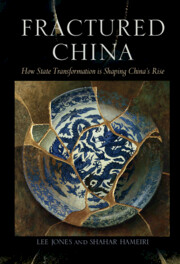Book contents
- Fractured China
- Fractured China
- Copyright page
- Dedication
- Contents
- Figures
- Maps
- Tables
- Acknowledgements
- Abbreviations
- Introduction
- 1 State Transformation and Chinese Foreign Policy
- 2 State Transformation and the South China Sea
- 3 Chinese Non-Traditional Security Governance in the Greater Mekong Subregion
- 4 China’s International Development Financing
- Conclusion
- References
- Index
3 - Chinese Non-Traditional Security Governance in the Greater Mekong Subregion
Published online by Cambridge University Press: 21 October 2021
- Fractured China
- Fractured China
- Copyright page
- Dedication
- Contents
- Figures
- Maps
- Tables
- Acknowledgements
- Abbreviations
- Introduction
- 1 State Transformation and Chinese Foreign Policy
- 2 State Transformation and the South China Sea
- 3 Chinese Non-Traditional Security Governance in the Greater Mekong Subregion
- 4 China’s International Development Financing
- Conclusion
- References
- Index
Summary
This chapter presents the book’s second case study: Chinese efforts to manage ‘non-traditional’ security issues in the Greater Mekong Subregion. It focuses on the challenges of illegal narcotics and associated criminal activity, particularly banditry on the Mekong river, to which China has become more exposed through its ‘reform and opening up’. Contrary to widespread assumptions that ‘Westphalian’ China is leery of undermining sovereignty, we show that Chinese agencies have actually moved to tackle these problems at source by sponsoring opium-substitution programmes and transboundary law-enforcement projects in Laos and Myanmar. The outcomes of these interventions depend on how Chinese party-state transformation dynamics interact with socio-political conflicts in these target states. On the Chinese side, opium-substitution has been hijacked by local cadre-capitalists in Yunnan province, skewing implementation towards their sectional interests. This has intersected with predatory social relations in Myanmar and Laos to undermine drug-suppression efforts. Conversely, Chinese central government agencies have had greater success in corralling neighbouring counterparts into a transnational policing network, recently cemented into a new international organisation, the Lancang-Mekong Law Enforcement and Security Centre.
Keywords
- Type
- Chapter
- Information
- Fractured ChinaHow State Transformation Is Shaping China's Rise, pp. 121 - 165Publisher: Cambridge University PressPrint publication year: 2021
- 1
- Cited by

